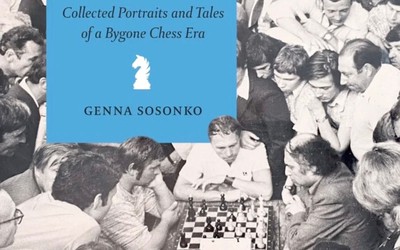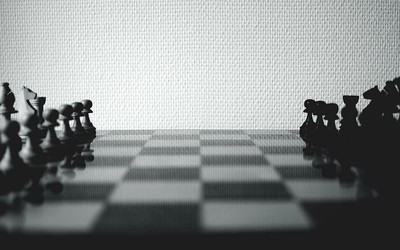
Photo by Nathan Dumlao on unsplash.com
My impressions of The Chess Gym
I've joined The Chess Gym - new chess community from FM Nate Solon and Martin Justesen.Introduction
Last year I started following good chess blogs on SubStack, in particular FM Nate Solon’s “Zwischenzug” and Martin Justesen’s “Say Chess”. I like their chess content and quantitative-based approach to things - it appealed to my programmer’s self. I felt that the authors are knowledgeable, serious and often give evidence-based and data-driven advice. Then, in early 2024, I learnt that Nate and Martin combined their efforts and started a new chess community called “The Chess Gym”. I was intrigued and also remembered good old days when I was a part of another online chess community and how I enjoyed that, so I paid $20 and joined!
In this post I will first summarise what Chess Gym does and then give my impressions at the end.
How it works
The Chess Gym is a community that is based around a simple idea that it’s better to work on something useful regularly and consistently rather than to binge solve tons of tactics one day and do nothing for three days after that. Nate and Martin consider playing, annotating and solving to be the core activities for chess improvement.
To this end Chess Gym provides a training program that includes three simple things: daily positions, weekly sparring games with post-game reviews, and weekly solitaire chess game. Let’s look at them one by one.
Daily Positions
There are several positions of different difficulties published every day:
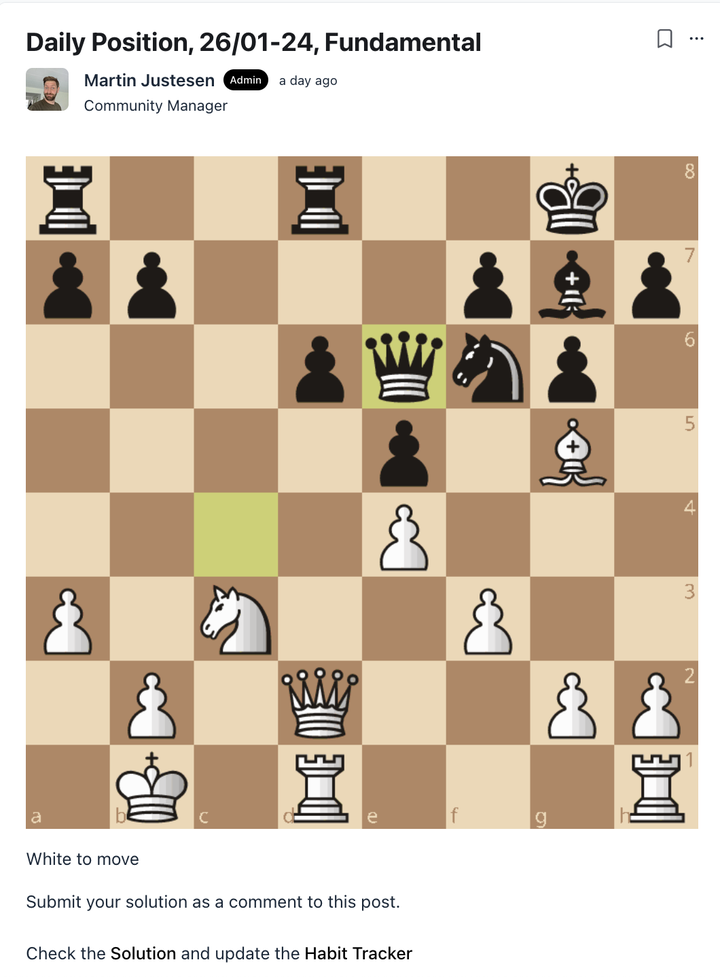
You are presented with a position, and asked to think for 5-10 minutes and choose the best move. The position is not necessarily tactical, it’s more like a real game than a puzzle. Sometimes you just need to make a good strategic move: creating a beautiful outpost for the knight or preventing a dangerous pawn break. Then you share your thoughts and lines as a comment for other people to see, and check the solution. There is no automatic grading, you grade your moves and ideas yourself. It is often instructive and interesting to read other people’s lines and thoughts, noting the differences to your thinking.
Weekly Sparring Game
Of course just solving puzzles is not enough to play good chess, one needs to actually practise and play real games. It’s considered beneficial to play slower games, so that one can evaluate positions deeper and have time to think about strategic concepts.
However, just playing slow games online with strangers is somewhat risky because of potential “sore losers” behaviour - sometimes people just stop playing in lost positions and one is forced to wait until their time runs out. This is certainly more annoying in slower games. One solution is to find a community where you know the people, and Chess Gym provides exactly that.
Each week you are supposed to find a partner, play a sparring game, preferably do a post-mortem analysis over a video call, annotate the game and post annotations for others to see. Recommended time control is 30 min + 20 sec increment.
So far I’ve played three games in my first three weeks (two with lower rated players and one with a higher rated). They were good games, and I really enjoyed the post-mortems: it’s always fun to discuss the games and meet new people.
As an example, here is my annotated sparring game played against Marco Motta:
Weekly Solitaire Chess Game
It’s also sometimes called “Guess The Move”. Basically, there is an annotated instructive game (usually, but not necessarily, played by masters), you are asked to take one side, play over the game and guess the moves, one by one. It’s implemented as a Lichess study, which works quite well. Normally the opening moves are directly suggested and the guessing starts from move 10 or so. Many moves also have hints which you can open when you are stuck. At the end, you can also reveal all your tries, so you can identify which moves were particularly difficult to guess, focus on them and try to understand why. There is a funny Lichess octopus asking you questions:
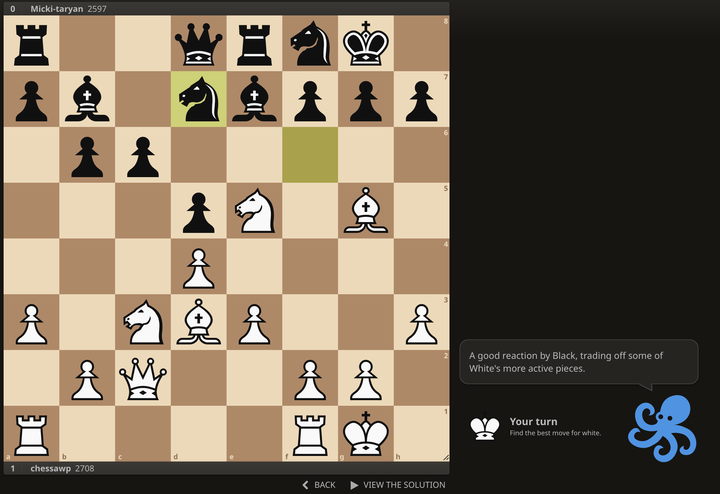
This is an interesting exercise, it’s deeper than just solving one puzzle: you get to see how the whole plans and counter-plans are envisaged and implemented. And it always feels good when you can guess the whole line played by Fischer!
Technicalities
Chess Gym uses Circle as a platform, which is basically a constructor for custom social networks or community platforms. It has a clean and nice interface (both on mobile and in web), direct messages, posts, chats and so on. It feels easy and convenient to use, I haven’t seen any major bugs so far.
My impressions
I think the biggest benefit of Chess Gym for me is the community itself. I’ve become an active member there: I participate in discussions, ask for opinions, suggest positions to solve, make jokes, read other members’ annotated games and overall have fun. This keeps interest in chess and motivation to improve strong. Also, there are not many other places where I can discuss chess in such a friendly setting, share a funny pawn structure from an ongoing game by World Champion, or a devilish puzzle I’ve seen in a book. There are more than 100 members now, with probably 3/4 of them actively participating. People are of different backgrounds (surprisingly many software engineers though!) and different countries (mostly US and Europe though). The whole spectrum of ratings is represented: people from under 1000 and all the way to masters level. The rating distribution more or less follows the normal curve.
I like the fact that everything has just started, feels fresh and exciting! Martin and Nate are open to suggestions and new ideas, things are changing and improving from an already solid base. In this way, members can affect how Chess Gym develops and feel that their opinions are important. Nate and Martin have weekly sessions when they discuss those member ideas: improving game scheduling, setting up a chess coding dojo/community as a special feature of Chess Gym, organising round robin tournaments and even making Chess Gym t-shirts. There is also a podcast discussing the project and happenings around it.
I also like the accountability idea: there is a habit tracker, which is public: you can see other people’s checkboxes and their streaks. This adds a certain gamification element and an incentive not to “break the chain”.
What I don’t like or like less? I think the game scheduling was somewhat difficult at times, but this is acknowledged by Nate and Martin who are working on a better solution. Also, sometimes I miss a more active chat, currently it feels more like a forum.
About daily exercises: I like to have this focused calculation work every day, when I just sit and think about a particular position, trying to dig deep. I think this practice is a main contributor to achieving my peak rating in Chess Tempo tactics recently. Surprisingly enough, just working hard on interesting positions improves my tactical awareness — I had a similar effect from studying positions from Yusupov books. Also, it’s important to write down the solution, it forces one to look at potential defensive moves carefully.
About guess the move: I liked playing over some of the games more than the others, preferring the ones that I understood better. Sometimes it feels somewhat frustrating to be unable to guess the move after many attempts, but often it’s instructive when you eventually get there and understand why it was played.
About weekly games: That’s definitely a big deal, I like playing and preparing for them. Not only do you play a game itself, but you can also play a metagame: you can analyse what your opponent played in the opening previously and see what you have against that. In this way you can learn something new about the openings. Of course, this is all optional and one can just play the game without any preparation. And the best part is the post-mortem analysis over Zoom/Skype! I also enjoy reading annotated games sometimes, several members write entertaining and/or instructive notes.
Finally, you probably have the most important question: Did it improve my chess results? In the last month or so my rating fluctuates close to my personal best (around 1800-1820 on ChessCom), and I’ve also achieved again my previous peak of tactical rating on Chess Tempo, so it looks like I am doing well! I haven’t seen a major spike in ChessCom rating, but at least I am able to keep quite close to the peak which is a minor achievement in itself, given how volatile and random those ratings are at my level.
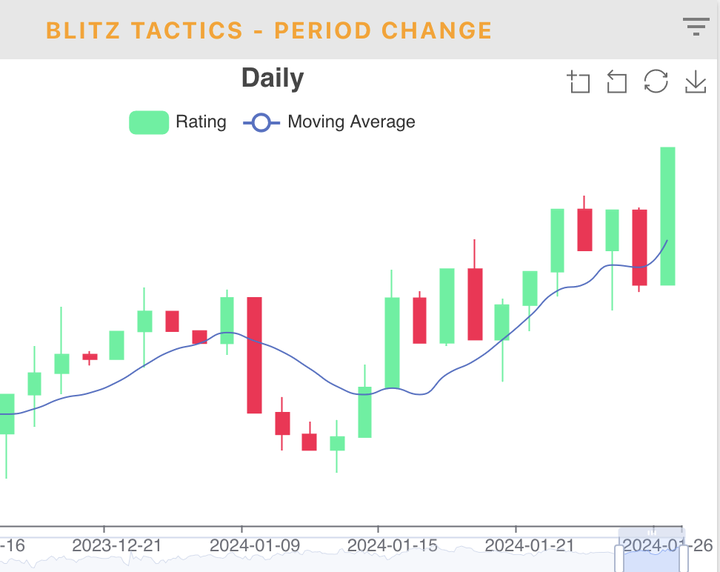
Outro
I hope that I’ve managed to transfer some of my enthusiasm to you, and if so, you are welcome to try the free trial of The Chess Gym. By the way, I am in no way affiliated with the project itself, just a happy gym member!
I am affiliated with this blog though, being its only author, so if you liked the post please consider subscribing to it via SubStack, it's called "64 Squares". In the next few posts I plan to review the new ChessBook (a.k.a ChessMadra) app for creating and practising opening repertoires, and maybe prepare an overview of good European tournaments for a travelling chess amateur.
